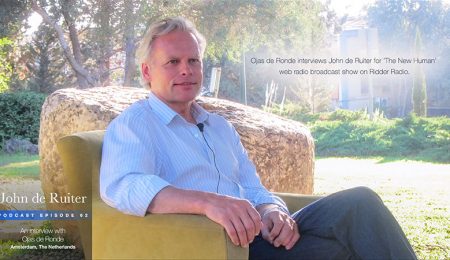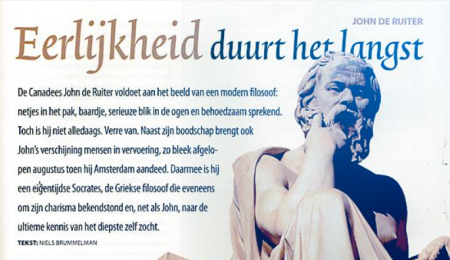This translation originally appeared in Nyt Aspekt & Guiden Magazine April 2016. View the original Danish article here.
John de Ruiter about his awakening: “Suddenly, I experienced a wonderful inner blossoming. I noticed that all in existence was more beautiful than I had ever seen before.”
He points out that awakening doesn’t come from looking and searching, but by relating to what is already here — right under our noses. “We are in contact with our true nature several times throughout every day, without realizing it,” says Canadian philosopher, John de Ruiter.
The line from Edmonton, Canada is somewhat noisy, but the deep and pleasant voice of John de Ruiter does deliver a sharp and clear message across the Atlantic: “It’s tragic and comical that we, in fact, experience our true nature every single day, but still are estranged from it and therefore search for it as if it needs to be found.”
His sentence is left hanging in a pause that feels like a silent and compassionate smile. John describes himself as ‘pragmatic’ and he likes to talk about the very big issues in life – awakening, consciousness, and enlightenment – in relationship to this very concretely lived life.
“When we are very thirsty and finally get something cool to drink, there we get, even if only for a short time, an experience of our full being. We feel the healing, breathe out deeply and say ‘ahh.’ Or when we soak into a warm bathtub; there, too, is a short experience of deep relaxation and pure presence which is deeper than thoughts, emotions, and sensations. But maybe the best example is when we fall asleep. There, the process is the same as in awakening.”
“It is rarely seen in adults.”
“We relax the personality, let go of its grip, thoughts and emotions make way, past and future disappear, we drop into the heart. We return to what we truly are and always have been.”
JdR pauses again.
“We struggle far too much and overshoot what we are aiming at.”
His message, even delivered across the Atlantic, is clearly not in his words alone. His way of pausing, his intonations, and his energy also carry the message.
“We have no need to find, invent or create, because we really already have hundreds of daily experiences where we are our authentic being, but we search and search and try to understand through thought and emotion instead of relating to what is. We struggle far too much and overshoot what we are aiming at.”
John points out, that we must “engage directly with reality,” which means that we must “drop into the heart.”
“When we are not confined by thoughts, emotions, sensations and will, we open the door to a new depth of awareness which allows us to experience what we really are.”
Look at a small child.
This experience that John points to us having several times each day, he calls a “coming home.”
“It is clear to us when it happens, and it is clear to us when somebody else is coming from that. A relaxed and calm presence quietly glows. A nurturing healing will happen when we do not rely on things, on the past, on emotions. And that shows.”
He points at relaxation both in the physical, and in thoughts and emotions, as the central point:
“It goes without saying that this is not about lying about on your sofa, but we do know to relax; it’s natural to us. Thus, it’s something prior to any process, below any technique inherent in any religious or therapeutic tradition. A physiological relaxation of the nervous system, together with a letting-go of thoughts and emotions, leads to an openness and softness of heart, and beyond that to a wide and open awareness, to our true being.”
As many before him, John describes the qualities of our being as those of a little child: natural, innocent, joyous and without concerns of having to be or do anything in particular.
Over the phone, with his calm voice, he states that “even if it is our true nature, it is rare to see it in an adult.” Again, I can almost hear him smile.
“Through our upbringing, layer upon layer of conclusions, constructions and judgments are piled upon our selves, alienating us from our true being,” John says. But he also states that the path is open to all.
“Separation stems from mental constructions and related emotional reactions. When we relax and drop down into the heart, we can maintain awareness, even in the midst of thoughts and emotionally difficult situations. This is accessible for all, independent of cultural and religious background.
We must take care that techniques and traditions don’t become crutches. That’s a misunderstanding. We don’t need anything to be what we already are. Just look at a little child.”
Interview by author and teacher Bo Heimann www.boheimann.com



